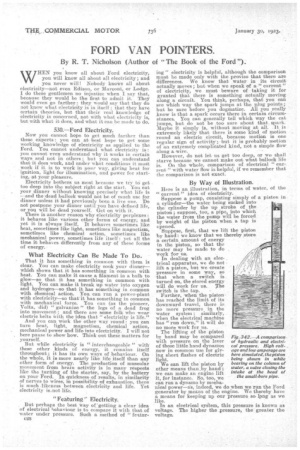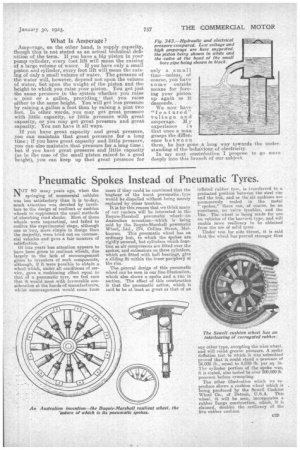FORD VAN POINTERS.
Page 28

Page 29

If you've noticed an error in this article please click here to report it so we can fix it.
By R. T. Nicholson (Author of "The Book of the Ford ") .
WHEN you know all about Ford electricity, you will know all about all electricity ; and you never will Nobody knows all about electricity—not even Edison, or Marconi, or Lodge. I do these gentlemen no injustice when I say that, because they would be the first to admit it.. They would even go farther : they would say that they do not know what electricity is in itself ; that they have certain theories, but that their real knowledge of electricity is concerned, not with what electricity is, but with what it does, and what. it can be made to do.
530.—Ford Electricity.
Now you cannot hope to get. much farther than these experts : you can at best hope to get some working knowledge of electricity as applied to the Ford. You cannot understand what. electricity is: you cannot even understand why it works in certain ways and not in others ; but. you can understand that it does work, and tinder what conditions it must work if it is to work in your way, giving heat for ignition, light for illumination, and power for start ing, at your pleasure. .
Electricity bothers us most because we try to get too deep into the subject right, at the start. You eat your dinner without knowing precisely what. life is --and the'dearl bullock would not be of much use for dinner unless it had previously been a live one. Do not postpone your dinner until you have defined life, . or 376.4 will be dead yourself. Get on with it. There is another reason why electricity perplexes: it behaves like various other forms of energy, and yet it is always itself. It behaves sometimes like heat, sometimes like light, sometimes like magnetism, sometimes like chemical action, sometimes like mechanical power, sometimes life itself : yet all the time it behaves, differently from any of these forms of energy.
What Electricity Can Be Made To Do.
That it has something in common with them, is clear. You can make electricity cook your dinner— which, shows. that it has something in common with heat. You can make it cause a filament in a bulb to glow—so that it has something in common with
• light. You can make it break up water into oxygen and hydrogen—so that it has something in common with chemical action. You can Tun a power-plant with electricity—so that it has something in common with mechanical force. You can (as the pioneer, Volta, did) "galvanize " ethe legs of a dead frog into movement ; and there are some folk who wear electric belts With the idea that " electricity is life."
And you can work the other way round: you can turn heat., light, magnetism, chemical action, mechanical power and life into electricity. I will not here pause to show how. Think out these matters for yourself. .
But while electricity is "interchangeable " with' these other kinds of energy, it remains itself throughout ; it has its own ways of behaviour. On the. whole, it is more nearly like life itself than any other form of energy. The production of muscular movement from brain activity is in many respects like the turning of the starter, say, by the battery on your Ford. In quickness of results, in similarity of nerves to wires, in possibility of exhaustion, there is much •likeness between electricity and life. Yet electricity isinot life.
"Featuring' Electricity.
But perhaps the best Way of' getting a clear idea of electrical behaviour is to compare it with that of water under pressure. Such a method of " featur (328
ing " electricity is helpful, although the comparison must he made only with the proviso that there are differences. We know that water in its circuit actually moves ; but when we speak of a " current " of electricity, we must beware of taking it for granted that there is something actually moving along a circuit. You think, perhaps, that you can see which way the spark jumps at the plug points; but be sure before you dogmatize. All you really know is that a spark occurs there in certain circumstances. You can generally tell which way the cat jumps, but do not be too sure about that spark. Maybe it simply is, without moving at all. It is extremely likely that there is some kind of motion round an electric circuit, because motion is one regular sign of activity-; but it is probably motion of an extremely complicated kind, not a simple flow' along a wire.
However, do not let us get too deep, or we shall starve because we cannot make out what bullock life is. On the whole, comparison of electrical " current." with water flow is helpful, if we remember that the comparison is not exact.
By Way of Illustration.
Here is an illustration in terms of water, of the "
current" idea of electricity.
Suppose a pump, consisting simply of a piston in a cylinder—the water being sucked into the cylinder by the up stroke of the piston;. suppose, too, a pipe, into which the water from the pump will be forced. by weight of the piston when a tap is opened.
Suppose, first, that we lift the piston by hand: we know that we thereby store a certa.in amount of energy in the piston, so that the water may be made to do work for us.
In dealing with an electrical apparatus, we do not lift a piston, but we create pressure in some way, so that when a switch is turned on, the stored energy will do work for us. The switch is the tap.
Further, when the pietou has reached the limit of its downward travel, there is no more pressure in the water system ; when the electrical machine has "run down," it will do no more work for us.
The lifting of the piston by hand may he compared with pressure on the lever of those little hand dynamos now in common use for giving short flashes of electric light.
We can lift the piston by other means thanhy.hand ; we can make an engine lift it, for instance. So, too, we can run a dynamo by mechanical power—as, indeed, we do when we run the Ford generator by means of the engine. We thereby have a means for keeping up our pressure so long as we like.
In an electrical syitein, this pressure is known as voltage. The higher the pressure, the greater the voltage.
Fig. 342.—A comparison of hydraulic and electrical pressure. High voltage and low amperage are here simulated, the piston being shown In white bearing on the column of water, a valve closing the intake at the head of
the small-bore pipe.
What Is Amperage ?
Amperage, on the other hand, is supply capacity, i
though this s not stated as an actual technical definition of the term. If you have a big piston in your pump cylinder, every foot lift will mean the raising of a large volume of water. If you-have only a small piston and cylinder, every foot lift will mean the raising of only a small volume of water. The pressure of the water will, however, depend not upon the volume of water, but upon the weight of the piston and the height to which you raise your piston. You get just the same pressure in the system whether you raise a Dint or a gallon, providing: that you raise either to the same height. You will get less pressure by raising a gallon a foot than by raising a pint two feet. In other words, you may get great pressure with little capacity, or little pressure with great capacity, or you may get great pressure and great capacity. You can have it all ways.
If you have great capacity And great pressure, you can maintain that great pressure for a long time ; if you have great capacity and little pressure, you can also maintain that pressure for a long time ; but if you have great pressure and little capacity (as in the case of the small piston raised to a good height), you can keep up that great pressure for only a small time—unless, of course, you have some outside means for forcing your piston up again as it descends..
We now have "f e a tured" voltage and amperage. My experience i s that once a man grasps the difference between them, he has gone ,a long way towards standing of the behaviour of electricity.
In my next contribUtion I propose to
deeply into this branch of our su jeet.


































